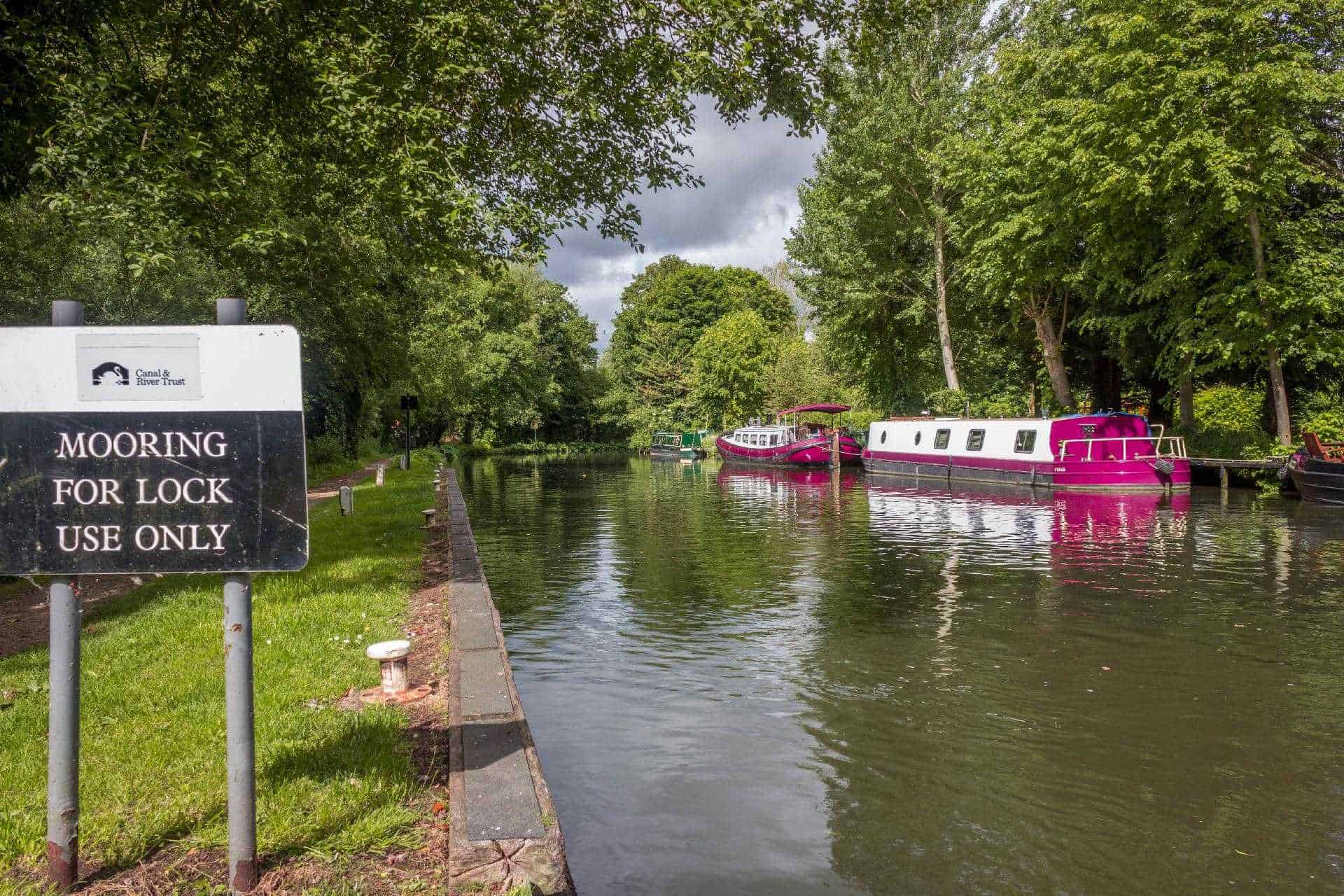Whether you want to take a boating holiday or thinking about making that exciting investment in a canal boat, it’s essential to understand the rules. Failing to abide by these regulations set by authorities (i.e. The Canal & River Trust) will result in you receiving a hefty fine. Even if you don’t mean any harm, rules are rules, and we have to stick by them. But can you moor a canal boat anywhere?
Boats are almost allowed to moor anywhere alongside canal towpaths. If you’re on a boating holiday, mooring is free unless otherwise specified, but you should be safe and consider others while doing so. If you’re living on a boat, you can moor up to 14 days free along the towpath. However, in popular places, look out for signage that tells you differently.
As you can gather from the above, you’re able to moor pretty much anywhere as long as it’s safe to do so. Mooring is free for people on boating holidays (aka renting a boat). However, individuals wanting to live on a canal full time will have to pay a mooring fee (unless they’re there for 14 days or less). This mooring fee massively depends on your location. For example, mooring in central London is estimated to cost around £1,000 a month, whereas outside the city around £120.
To make this easier to understand, below we break down each mooring stay to ensure you’re following the rules. First let’s talk about basic canal etiquette when it comes to cruising the canals. Not all of this will get you officially fined, but if you want a smooth life on the cut, you should follow all the same 🙂
Where Not to Moor on the Canals?
Yes, you can moor almost anywhere it’s true. But there are some key exclusions that you should know about below:
Lock Landings
A lock landing is an area immediately by a canal lock and serves as an area that boaters can prepare for or wait to go into a lock. Therefore, the Canal and River Trust don’t want people blocking these lock landings by mooring on them. It should be fairly obvious when you are on a lock landing as their are usually multiple signs warning you. To be sure, just don’t moor up close to a lock itself 🙂
Water Points
For any of you that have ever lived on a canal boat, you will know that water is critically important. It is not like a land based home where you have infinite supply. You have a tank on your boat that will often only last one or two weeks. The Canal and River Trust provide water points (basically taps like you would see in your garden at home) along the canal. So don’t moor up close to a water point and restrict other boaters use of it. Don’t worry, if you accidentally moor too close to one you will soon have angry boaters banging on your window, so it should be easy to tell 🙂
Bridges and Tunnels
Similar to lock landings, the CRT don’t want boaters mooring too close to bridges and tunnels as it would restrict other boater’s ability to get through them. So make sure to stay well clear.
Moor Safely
We talked above about the idea of mooring safely, but what does this mean? Although this should be common sense, it just means don’t be a hazard to other boaters when moored up. So don’t moor up on blind corners or close to marina entrances or winding holes where boats turn. This plays a massive part in the etiquette of canal life.
How Much Does It Cost to Moor A Canal Boat?
As mentioned above, fees only apply to owners of boats rather than people on boating holidays. However, if you do live on a boat, you should probably consider joining a boat club. A good club to join is the Association of Waterways Cruising Club (AWCC), here you’ll join a club of like-minded people and also gain access to cheaper moorings.
If you want to moor for more than 14 days, prices will vary massively depending on where you are. Mooring pricing will typically be determined over two factors, boat length, and market demand. So, make sure you do plenty of shopping around before you make your final decision.
Short-stay mooring
Short-stay moorings, commonly known as visitor moorings, are when boaters can moor for a specific amount of time that is usually signposted around the mooring point. These are ideal locations if you want to moor up for a bite to eat, or just waiting for your mooring reservation to open up elsewhere. On this map, supplied by the Canal River Trust, you can see exactly where all the short-stay mooring spots are on our canals.
Mooring at a short-stay spot is typically free and depending on the signposts around the location, it could be for 4 hours, 48 hours, 7 days, or even 14 days. By all means, make sure you abide by these rules. Failing to do so and exceeding your stay will result in a £25 charge each day.
A helpful tip to know, if you’re travelling via boat between the 1st of November until the 31st of March, most short-stay moorings convert into 14 day stays for free. But again, depending on the popularity of the area, this may be different.
Long-term mooring
This type of mooring location can have several names. These can include permanent moorings, long-term moorings, or even home mooring sites. You’ll need a long-term mooring agreement if you’re not continuously cruising (moving location every 14 days). To get hold of such an agreement, it would typically be sold by a private company or boat club. The contracts are flexible and will widely depend on how long you want to stay, and these could be from three months to three years.
Many boaters that live long-term in a designated area tend to stay in marinas or a basin in the main lines. This is because it offers a great deal of security and convenience. ABC Leisure allows you to moor in various locations in the United Kingdom. Click here to see their rates.
Waterside mooring
The most popular type of long-term mooring is called Waterside mooring. This is because the Canal River Trust operates it. This trust has over 330+ sites in both England and Wales, meaning you have plenty of mooring locations to choose from.
A great thing about this organisation is that all the profits go towards making the waterways better for boaters and everyone to enjoy.
Winter mooring
Most places within the UK will extend their free period in the winter months. They do this because there’s less traffic flowing through our rivers. However, this is only for a maximum of 14 days, depending on where you are. So if you plan on mooring your boat over the winter months, you’ll need a winter permit.
If you have a permanent mooring license, then you won’t need a winter one. But if you don’t, you’ll need one to moor your boat during the winter months. These prices are usually lower compared to the summertime and can range from one to four months.
Again, pricing will follow a similar criterion to a long-term mooring permit, such as location, level of demand, and vessel size. The pricing bands are below:
- Band 0 – £21
- Band 1 – £19
- Band 2 – £17
- Band 3 – £14.70
- Band 4 – £10.90
- Band 5 – £8.70
- Band 6 – £7.10
More information about pricing and availability can be found on the Canal River Trust’s website.
Continuous Cruiser
Something we’ve mentioned above is a continuous cruiser. These are for individuals that are full time living on their boats and like to cruise the canals non-stop. Don’t get me wrong, “non-stop” doesn’t necessarily mean you can’t moor anywhere. They allow continuous cruisers to moor up to 14 days, completely free of charge in most places.
However, wherever you are, be sure to read up on the local rules, as free mooring may not apply over a set amount of time.
Conclusion
As you can see from the above, mooring anywhere is nearly possible. However, you must follow local guidance and make sure you’re doing it in a safe manner. We’ve also spoken about the costs of mooring your canal boat and have elaborated about the different types of permits you’re able to obtain. Knowing this is extremely important to ensure you’re following the rules and avoiding any fines that may be coming your way. Before mooring anywhere, make sure you’re aware of their regulations to minimise the chances of this happening.



![What Happened to Cruising The Cut [Narrowboat Youtuber]](https://canalboatuk.com/wp-content/uploads/2022/08/cruising-the-cut-youtube-channel-211x150.png)
